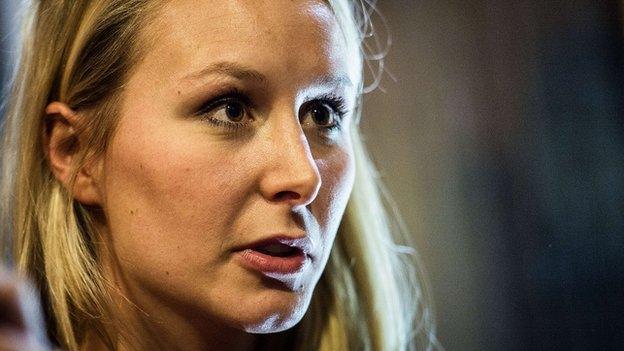France: Marine Le Pen goes on trial over Muslim remarks
- Published
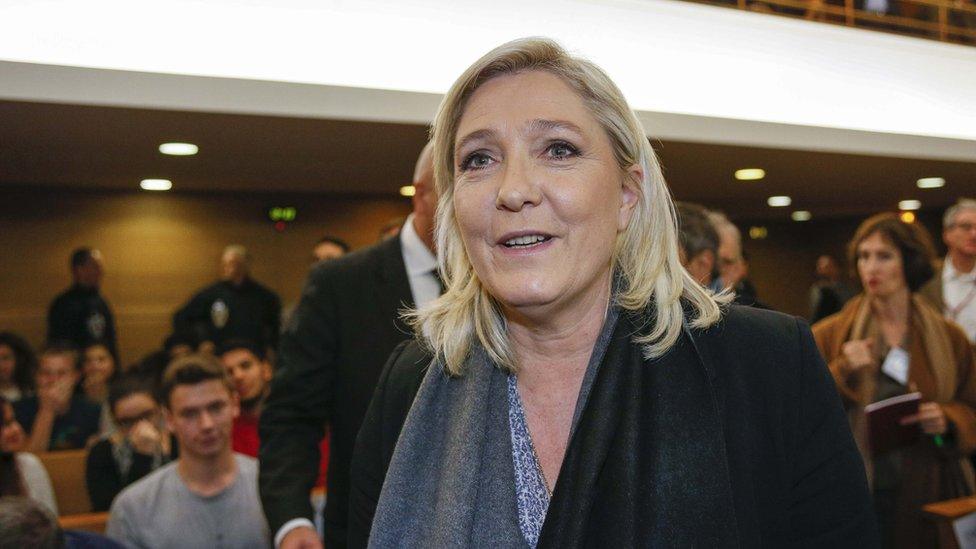
Marine Le Pen questioned the timing of the trial, little more than a month before regional polls
French National Front leader Marine Le Pen has appeared in court in Lyon, to answer charges of inciting racial hatred, for comparing Muslims praying in the street to the Nazi occupation.
She made the comments at a rally in the city in 2010 when she was fighting for the leadership of the party.
Ms Le Pen insisted on Tuesday she did not commit any offence.
And the prosecutor called for her acquittal, saying she was not referring to the whole Muslim community.
The National Front (FN) leader had only spoken about a specific number of people and was exercising her freedom of speech, Bernard Reynaud told the court.
The case was originally dropped last year by the Lyon court of appeal but revived by anti-racism groups who made a civil complaint.
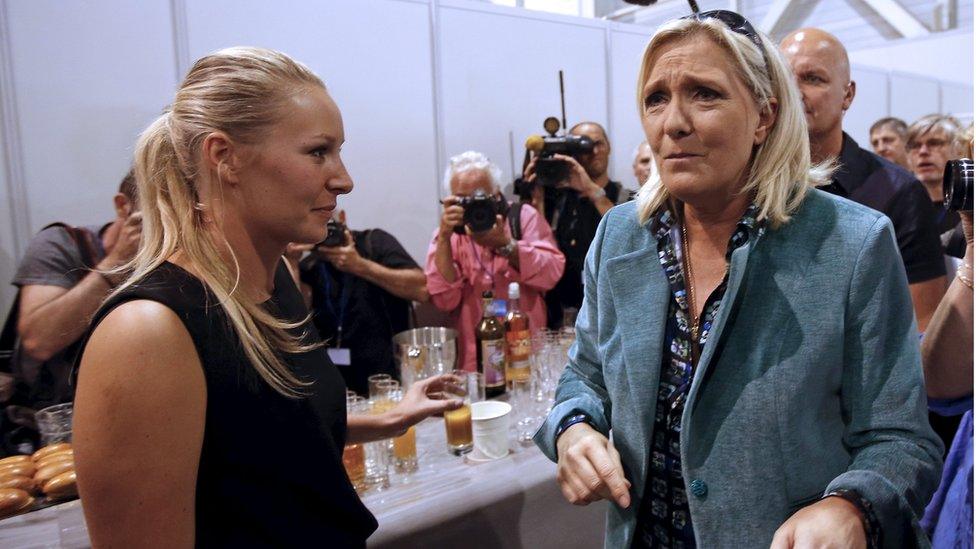
Marion Marechal-Le Pen (L) is leading the FN's campaign to win the Paca region in December elections
Ms Le Pen's anti-immigration and anti-EU message is attracting increasing support in France and her party is hoping to win two French regions in December local elections.
The judge in Lyon will deliver a ruling on the case in December.
Timing of trial
It was during a campaign speech in Lyon in 2010, a few months before she became leader, that Marine Le Pen spoke out about Muslims worshipping in the streets because mosques were full.
"I'm sorry, but some people are very fond of talking about the Second World War and about the occupation, so let's talk about occupation, because that is what is happening here," she told National Front supporters.
"There are no tanks, no soldiers, but it is still an occupation, and it weighs on people."
Outside court on Tuesday she questioned the timing of the trial.
"We're a month away from a regional election and this affair dates back five years," she told reporters.
An opinion poll at the weekend, external suggested her niece, Marion Marechal-Le Pen, could wrest control of the key southern region of Provence-Alpes-Cote d'Azur (Paca) from the governing Socialists.

Key moment for Le Pen, by Lucy Williamson, BBC Paris correspondent
This trial goes right to the heart of the National Front's revamped political campaign.
Under Marine Le Pen, the party has tried to "detoxify" its public image and distance itself from accusations of racism and anti-Semitism, but critics say its focus has simply switched to Muslims.
Not so, says the party leadership: their target is not Muslims per se, but Muslim extremists; those whose belief and behaviour threatens the "uni-cultural" France that Ms Le Pen envisages.
The FN has been treading a careful line between broadening its appeal to a wider section of voters, and voicing what it says are the legitimate concerns of France's "forgotten" working classes, eking out a precarious existence in the face of France's immigration policies and globalised economy.
The Lyon trial could deliver a vicious kick to Ms Le Pen's work on cleaning-up her party's image (and also to her own chances in December's regional elections); or it could provide another chance for the party to present itself as victimised by the French political system; pitted against remote, out-of-touch elites.

Alarm at the party's rise has prompted President Francois Hollande to warn France not to take the risk of backing the far right.
"Don't play with this way of voting just to send a message, just because of unhappiness and anger," he told French radio. "For investors, for external trade, jobs and growth, there will be consequences."
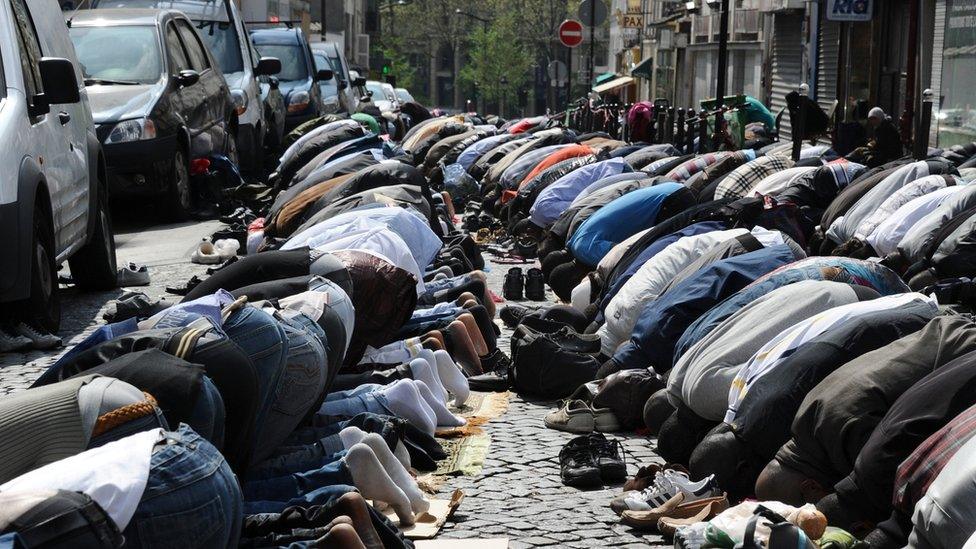
A ban on praying on the streets of Paris angered many of the city's Muslims
The practice of Muslims praying in the streets was banned in Paris in 2011 after a political outcry.
Ms Le Pen was investigated for her public remarks but the initial inquiry was closed without action in 2011.
An anti-racism group then filed a new complaint, which led to a judicial inquiry being launched in 2012. Ms Le Pen was eventually stripped of her immunity from prosecution by the European Parliament in 2013.
She is accused of incitement to discrimination, violence or hatred towards a group of people because of their religious affiliation and if found guilty could face up to a year in jail and a fine of €45,000 (£33,000; $51,000).
The French Council of the Muslim Faith said her remarks had fed a climate of Islamophobia.
- Published22 September 2015
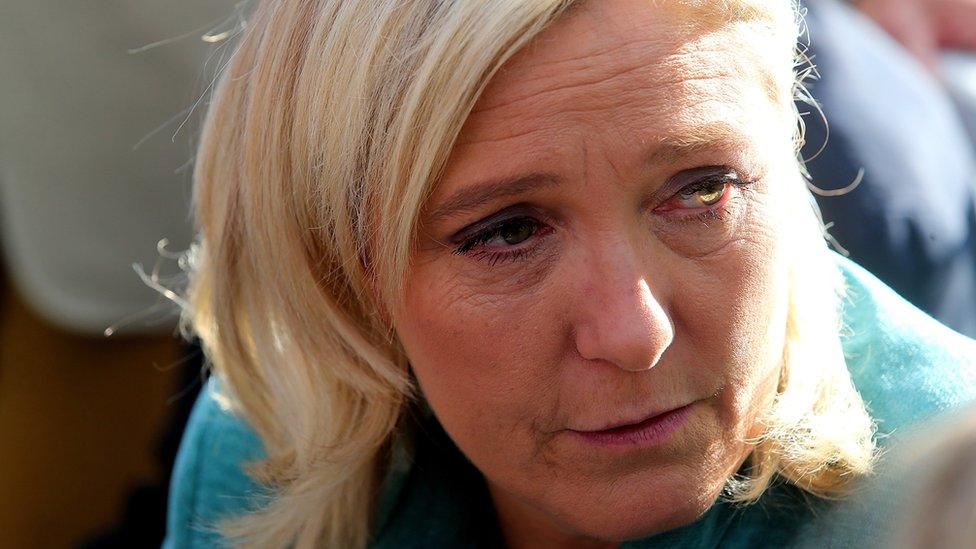
- Published2 July 2013
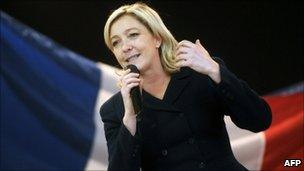
- Published6 May 2015
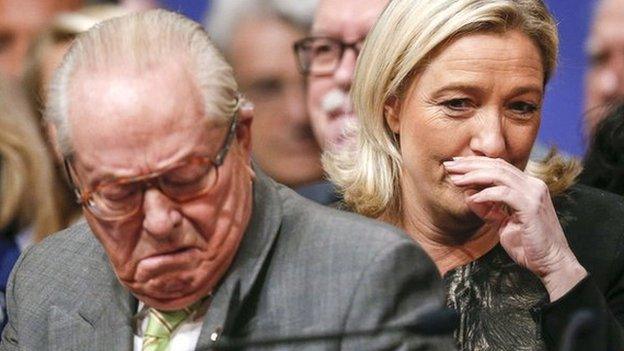
- Published13 March 2015
- Published26 January 2015
